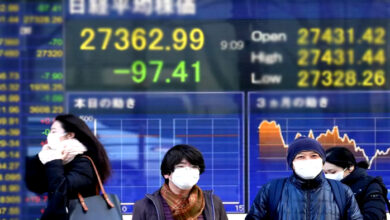The Chinese economy grew 3.9% from July to September.

Inflationary pressures are being closely watched by people who keep an eye on the market.
Most Asian stocks went up on Monday, but the main indexes in Hong Kong and Shanghai went down after Beijing said that China’s economy picked up speed in the last quarter.
Market watchers keep a close eye on inflationary pressures and any signs that regional economies might slow down.
The world’s second-largest economy grew at an annual rate of 3.9%, which was faster than the 0.4% growth rate of the previous quarter. However, this was still one of the slowest growth rates in decades, as the country had to close cities repeatedly to fight virus outbreaks.
Related: As a hawkish Fed weighed in, Asian stocks declined and experienced weekly losses.
Japan’s main stock market index, the Nikkei 225, went up by almost 1% in the morning to 27,156.95. The S&P/ASX 200 in Australia went up 1.5% to 6,776.50. The Kospi went up by 1.1% to 2,238.00. The Hang Seng in Hong Kong fell 4.3% to 15,509.38, and the Shanghai Composite index fell 0.7% to 3,017.00.
In China, Communist Party leader Xi Jinping gave himself a third five-year term. Xi didn’t show any signs that he wanted to change the strict “zero-COVID” policy, which has hurt business and trade. He said that the policies that are making things hard with Washington and Asian neighbours would not change.
The outlook for London’s FTSE 100 went down a little bit after former Prime Minister Boris Johnson said he wouldn’t run to lead the Conservative Party. Rishi Sunak, who used to be the head of the Treasury, is now the favourite to replace Liz Truss. Truss quit last week after her plan to cut taxes caused chaos in the financial markets.
Wall Street had a broad rally at the end of last week, with a lot of the gains coming from technology stocks, retailers, and health care companies.
The S&P 500 rose 2.4% to 3,752.75 and registered its best weekly gain since June, at 4.7%.
The Dow finished at 31,082.56, up 2.5%, and the Nasdaq composite went up 2.3%. The Russell 2000 index went up 2.2% and ended the day at 1,742.24.
Investors have been looking at how much money companies make as a way to figure out how inflation and rising interest rates are affecting economies around the world.
At its meeting in November, the Federal Reserve is likely to raise interest rates by another three-quarters of a point. That’s three times as big as what the Fed usually does.
The U.S. dollar is now worth 148.82 Japanese yen, up from 147.65 yen. It was said that after the dollar rose above 150 yen on Friday, the Bank of Japan stepped in to help the yen. The dollar went down after the intervention. The price of a euro went down from 98.62 cents to 98.30 cents.
Related: China pulled down Asian stocks, and UK inflation is on the radar.
The growing strength of the dollar against the yen and other currencies has made inflation worse in those countries by making imports and debt payments more expensive.
In energy trading on the New York Mercantile Exchange, the price of U.S. crude fell 43 cents to $84.62 per barrel. Brent crude, which is the international standard, fell 25 cents to $93.24 a barrel.





